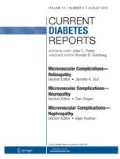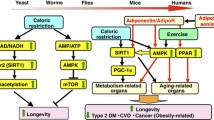Abstract
Adipocyte-derived adiponectin is an insulin-sensitizing and antiatherosclerotic hormone, and replenishment of adiponectin in animal models ameliorated insulin resistance and atherosclerosis. In humans, recent studies have demonstrated that adiponectin level is a good predictor of developing type 2 diabetes and coronary artery disease. Decreasing level of adiponectin is caused by the interaction between genetic factors, such as single nucleotide polymorphisms in the adiponectin gene, and environmental factors, such as high-fat diet. Agents that increase blood level of adiponectin or enhance the actions of adiponectin can be an ideal medicine for ameliorating insulin resistance and type 2 diabetes.
Similar content being viewed by others
References and Recommended Reading
Weyer C, Funahashi T, Tanaka S, et al.: Hypoadiponectinemia in obesity and type 2 diabetes: close association with insulin resistance and hyperinsulinemia. J Clin Endocrinol Metab 2001, 86:1930–1935.
Hotta K, Funahashi T, Bodkin NL, et al.: Circulating concentrations of the adipocyte protein adiponectin are decreased in parallel with reduced insulin sensitivity during the progression to type 2 diabetes in rhesus monkeys. Diabetes 2001, 501:126–133.
Arita Y, Kihara S, Ouchi N, et al.: Paradoxical decrease of an adipose-specific protein, adiponectin, in obesity. Biochem Biophys Res Commun 1999, 257:79–83.
Yamauchi T, Kamon J, Waki H, et al.: The fat-derived hormone adiponectin reverses insulin resistance associated with both lipoatrophy and obesity. Nat Med 2001, 7:941–946. Demonstrated for the first time that adiponectin is an insulin-sensitizing hormone and a decrease of adiponectin has a major role in the pathogenesis of insulin resistance and, thus, type 2 diabetes.
Mori Y, Otabe S, Dina C, et al.: Genome-wide search for type 2 diabetes susceptibility genes in Japanese affected sibpairs. Autosomal scan supplemented with markers for 12 transcription factor genes and adiponectin gene. Diabetes 2002, 51:536–540.
Kissebah AH, Sonnenberg GE, Myklebust J, et al.: Quantitative trait loci on chromosomes 3 and 17 influence phenotypes of the metabolic syndrome. Proc Natl Acad Sci U S A 2000, 97:14478–14483.
Yamauchi T, Waki H, Kamon J, et al.: Inhibition of RXR and PPARgamma ameliorates diet-induced obesity and type 2 diabetes. J Clin Invest 2001, 108:1001–1113.
Kubota N, Terauchi Y, Miki H, et al.: PPAR gamma mediates high-fat diet-induced adipocyte hypertrophy and insulin resistance. Mol Cell 1999, 4:597–609.
Hara K, Boutin P, Mori Y, et al.: Genetic variation in the gene encoding adiponectin is associated with an increased risk of type 2 diabetes in the Japanese population. Diabetes 2002, 51:536–540.
Kadowaki T, Hara K, Yamauchi T, et al.: Molecular mechanism of insulin resistance and obesity. Exp Biol Med (Maywood) 2003, 228:1111–1117.
Comuzzie AG, Funahashi T, Sonnenberg G, et al.: The genetic basis of plasma variation in adiponectin, a global endophenotype for obesity and the metabolic syndrome. J Clin Endocrinol Metab 2001, 86:4321–4325.
Stumvoll M, Tschritter O, Fritsche A, et al.: Association of the TG polymorphism in adiponectin (exon 2) with obesity and insulin sensitivity: interaction with family history of type 2 diabetes. Diabetes 2002, 51:37–41.
Menzaghi C, Ercolino T, Paola RD, et al.: A haplotype at the adiponectin locus is associated with obesity and other features of the insulin resistance syndrome. Diabetes 2002, 51:2306–2312.
Vasseur F, Helbecque N, Dina C, et al.: Single-nucleotide polymorphism haplotypes in the both proximal promoter and exon 3 of the APM1 gene modulate adipocyte-secreted adiponectin hormone levels and contribute to the genetic risk for type 2 diabetes in French Caucasians. Hum Mol Genet 2002, 11:2607–2614.
Populaire C, Mori Y, Dina C, et al.: Does the -11377 promoter variant of APM1 gene contribute to the genetic risk for type 2 diabetes mellitus in Japanese families? Diabetologia 2003, 46:443–445.
Jacob S, Machann J, Rett K, et al.: Association of increased intramyocellular lipid content with insulin resistance in lean nondiabetic offspring of type 2 diabetic subjects. Diabetes 1999, 48:1113–1119.
Krssak M, Falk Petersen K, Dresner A, et al.: Intramyocellular lipid concentrations are correlated with insulin sensitivity in humans: a 1H NMR spectroscopy study. Diabetologia 1999, 42:113–116.
Staiger H, Tschritter O, Machann J, et al.: Relationship of serum adiponectin and leptin concentrations with body fat distribution in humans. Obes Res 2003, 11:368–372.
Spranger J, Kroke A, Mohlig M, et al.: Adiponectin and protection against type 2 diabetes mellitus. Lancet 2003, 361:226–228. Demonstrated for the first time that adiponectin is a predictor of type 2 diabetes developing in humans.
Lindsay RS, Funahashi T, Hanson RL, et al.: Adiponectin and development of type 2 diabetes in the Pima Indian population. Lancet 2002, 360:57–58.
Fumeron F, Aubert R, Siddiq A, et al.: Adiponectin gene polymorphisms and adiponectin levels are independently associated with the development of hyperglycemia during a 3-year period: the epidemiologic data on the insulin resistance syndrome prospective study. Diabetes 2004, 53:1150–1157.
Ouchi N, Kihara S, Arita Y, et al.: Adipocyte-derived plasma protein, adiponectin, suppresses lipid accumulation and class A scavenger receptor expression in human monocytederived macrophages. Circulation 2001, 103:1057–1063.
Kazumi T, Kawaguchi A, Sakai K, et al.: Young men with highnormal blood pressure have lower serum adiponectin, smaller LDL size, and higher elevated heart rate than those with optimal blood pressure. Diabetes Care 2002, 25:971–976.
Valsamakis G, Chetty R, McTernan PG, et al.: Fasting serum adiponectin concentration is reduced in Indo-Asian subjects and is related to HDL cholesterol. Diabetes Obes Metab 2003, 5:131–135.
Yamauchi T, Kamon J, Waki H, et al.: Globular adiponectin protected ob/ob mice from diabetes and ApoE-deficient mice from atherosclerosis. J Biol Chem 2003, 278:2461–2468.
Pischon T, Girman CJ, Hotamisligil GS, et al.: Plasma adiponectin levels and risk of myocardial infarction in men. JAMA 2004, 291:1730–1737.
Yang WS, Lee WJ, Funahashi T, et al.: Weight reduction increases plasma levels of an adipose-derived anti-inflammatory protein, adiponectin. J Clin Endocrinol Metab 2001, 86:3815–3819.
Esposito K, Pontillo A, Di Palo C, et al.: Effect of weight loss and lifestyle changes on vascular inflammatory markers in obese women: a randomized trial. JAMA 2003, 2:1799–1804.
Faraj M, Havel PJ, Phelis S, et al.: Plasma acylation-stimulating protein, adiponectin, leptin, and ghrelin before and after weight loss induced by gastric bypass surgery in morbidly obese subjects. J Clin Endocrinol Metab 2003, 88:1594–1602.
Savage DB, Tan GD, Acerini CL, et al.: Human metabolic syndrome resulting from dominant-negative mutations in the nuclear receptor peroxisome proliferator-activated receptor-gamma. Diabetes 2003, 52:910–917.
Yu JG, Javorschi S, Hevener AL, et al.: The effect of thiazolidinediones on plasma adiponectin levels in normal, obese, and type 2 diabetic subjects. Diabetes 2002, 51:2968–2974.
Tonelli J, Li W, Kishore P, et al.: Mechanisms of early insulinsensitizing effects of thiazolidinediones in type 2 diabetes. Diabetes 2004, 53:1621–1629.
Kondo H, Shimomura I, Matsukawa Y, et al.: Association of adiponectin mutation with type 2 diabetes: a candidate gene for the insulin resistance syndrome. Diabetes 2002, 51:2325–2328.
Waki H, Yamauchi T, Kamon J, et al.: Impaired multimerization of human adiponectin mutants associated with diabetes. Molecular structure and multimer formation of adiponectin. J Biol Chem 2003, 278:40352–40363.
Yamauchi T, Kamon J, Ito Y, et al.: Cloning of adiponectin receptors that mediate antidiabetic metabolic effects. Nature 2003, 423:762–769.
Author information
Authors and Affiliations
Rights and permissions
About this article
Cite this article
Hara, K., Yamauchi, T. & Kadowaki, T. Adiponectin: An adipokine linking adipocytes and type 2 diabetes in humans. Curr Diab Rep 5, 136–140 (2005). https://doi.org/10.1007/s11892-005-0041-0
Issue Date:
DOI: https://doi.org/10.1007/s11892-005-0041-0




